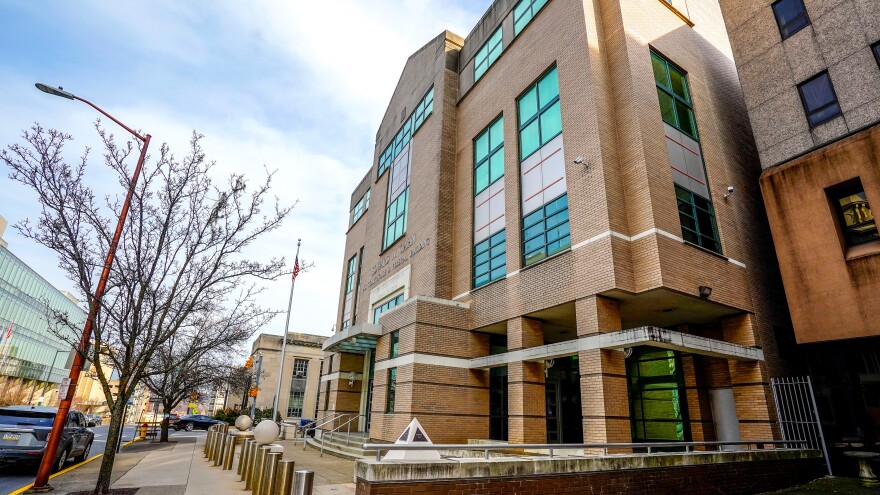ALLENTOWN, Pa. — A federal judge in an order filed Thursday asked both sides in a lawsuit over an After-School Satan Club's request to use Saucon Valley Schools property to address schools' right to limit free speech.
U.S. District Court Judge John Gallagher asked both the school district and the American Civil Liberties Union, which is representing the After-School Satan Club, to file additional briefs considering previous federal cases dealing with first amendment rights in schools.
- U.S. District Court judge John Gallagher ordered parties in the Satanic Temple's lawsuit with Saucon Valley School District to address how two prior cases affect the case
- The first case, Tinker v. Des Moines Independent Community School District, establishes that districts can abridge students' freedom of speech if that speech is "materially disruptive"
- The briefs submitted in response could help decide whether an after-school Satan club is allowed to meet on district property this school year
The cases mentioned both give school officials a right to curb students’ freedom of speech and expression if that expression is substantially disruptive.
Assessing previous cases
In March, the Satanic Temple and the ACLU sued the district, alleging that by revoking permission for an After-School Satan club to meet on school property, Saucon Valley School District violated its constitutional rights.
Officials from the district attributed the about-face to violations of District Policy 707, which requires outside groups meeting on school property to communicate that they are not sponsored by or endorsed by Saucon Valley Schools.
Court filings from the district argue that major disruptions — including school closing for a day because of a shooting threat — resulted from the violation.
The lawsuit asks the court to compel Saucon Valley School District to let the club meet on campus before the end of this school year. Gallagher heard arguments on that request last week.
To supplement last week’s hearing, Gallagher ordered both parties Thursday to assess a landmark case dealing with the first amendment rights of students, Tinker v. Des Moines Independent Community School District, and later cases that build on it.
'Materially and substantial interfere'
That case, argued in 1969, arose from a group of Des Moines students who were suspended for wearing black armbands to school in protest of the Vietnam War.
Those students sued the district for violating their first amendment rights, and their case eventually made it to the U.S. Supreme Court.
The court ruled that students do not “shed their constitutional rights to freedom of speech or expression at the schoolhouse gate,” and that the Des Moines school district violated students’ first amendment rights. Its ruling also held, however, that school officials can abridge freedom of expression in cases that “materially and substantially interfere” with school operations, beyond simply being controversial.
The court ruled that students do not “shed their constitutional rights to freedom of speech or expression at the schoolhouse gate,” and that the Des Moines school district violated students’ first amendment rights.
Its ruling also held, however, that school officials can abridge freedom of expression in cases that “materially and substantially interfere” with school operations, beyond simply being controversial.
Applying it to the Satan Club case
Gallagher asked lawyers representing the Saucon Valley School District and the Satanic Temple to address whether the district’s basis for revoking permission for an After-School Satan Club to meet on district property “satisfies the ‘substantial disruption’ test articulated in Tinker v. Des Moines.”
He also required the briefs to address a 2014 appeals court ruling in Dariano v. Morgan Hill Unified School District, which hinges on the standard established in Tinker.
In his order, Gallagher asked both parties to address whether the holding in Dariano — that districts correctly abridged students’ rights to head off potential disruptions — applies to the Satan Club case.
In Dariano, the Ninth Circuit Court of Appeals ruled that a Northern California school district was within its rights to ask students to remove shirts bearing the American flag on Cinco de Mayo, because they acted narrowly to head off likely disruptions.
The Ninth Circuit’s opinion references a “history of violence” in the district, including conflict along racial lines that flared on May 5 the year before regarding students wearing American flag shirts.
In his order, Gallagher asked both parties to address whether the holding in Dariano — that districts correctly abridged students’ rights to head off potential disruptions — applies to the Satan Club case.
Briefs in response to the order are due by noon Friday.


